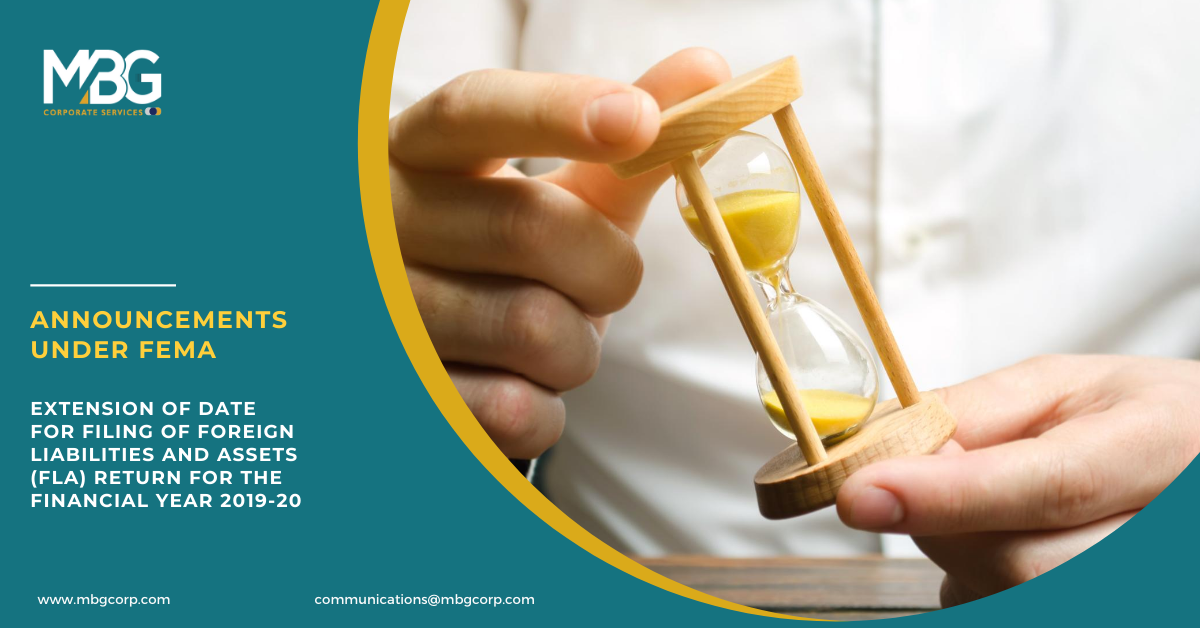Announcements under FEMA

Announcements under FEMA
Extension of date for filing of Foreign Liabilities and Assets (FLA) Return for the financial year 2019-20
The FLA Return is required to be submitted by all Indian companies which have received FDI or made any FDI abroad (overseas investment) in the previous year(s) including the current year i.e. who holds Foreign Assets or Liabilities in their financial statements. The due date of filing the FLA Return for the financial year 2019-20 was 15th July 2020 which was extended to 31st July 2020 and now has been further extended up to 14th August 2020.
Non-filing of the return before the due date will be treated as a violation of FEMA and penalty clause may be invoked for violation of FEMA.
Announcements by SEBI
Extension of date for submission of financial results for the quarter/half-year/financial year ended on 30th June 2020
The Securities and Exchange Board of India (SEBI) had earlier extended the time for submission of financial results by listed entities for the quarter/half-year / financial year ended 31st March 2020 to July 31, 2020, due to the impact of the CoVID- 19 pandemic.
In terms of Regulation 33 of the SEBI (Listing Obligations and Disclosure Requirements) Regulations, 2015 (“LODR Regulations”), every listed entity is required to submit its quarterly/half-year/annual financial results within 45 (forty-five) days or 60 (sixty) days, as applicable, from the end of each quarter/half-year/financial year. Accordingly, listed entities are required to submit the financial results for the quarter/half year ended June 30, 2020, on or before August 14, 2020.
Upon receiving several representations from the stakeholders, it has been decided to further extend the timeline for submission of financial results under Regulation 33 of the LODR Regulations, for the quarter/half-year/financial year ended June 30, 2020, to September 15, 2020.
Notification of Consumer Protection (Mediation) Regulations, 2020
The National Consumer Disputes Redressal Commission (NCDRC) has notified the Consumer Protection (Mediation) Regulations, 2020 with effect from 24th July 2020.
The said Regulations provide for a mediation cell comprising of a panel of mediators on the recommendation of a selection committee consisting of the President and a member of that Commission for matters relating to consumer disputes. The Regulations also include criteria for eligibility and disqualifications for empanelment as a mediator, which include any experts or other professionals with at least 15 (fifteen) years’ experience or a person having experience of at least 5 (five) years in mediation or conciliation. As per Regulations, the mediation shall be conducted in the presence of the parties or their authorized representatives or counsel. The Regulations aims at facilitating a voluntary resolution of the disputes between the parties, assist them in removing the misunderstandings, if any, and generating options to resolve their disputes, but shall not impose any term or any settlement upon the parties.
Notification of The Consumer Protection (E-Commerce) Rules, 2020
The Ministry of Consumer Affairs, Food, and Public Distribution has notified the Consumer Protection (E-Commerce) Rules, 2020 effective from 23rd July 2020.
These are a new set of rules and regulations for e-commerce companies under the Consumer Protection Act 2019.
Key highlights of the Consumer Protection (E-Commerce) Rules, 2020
1. These rules are applicable to all goods and services bought or sold over the digital or electronic network including digital products; all models of e-commerce, including marketplace and inventory models of e-commerce; all e-commerce retail, including multi-channel single-brand retailers and single-brand retailers in single or multiple formats; and all forms of unfair trade practices across all models of e-commerce.
2. These rules also apply to e-commerce entity which is not established in India, but systematically offers goods or services to consumers in India.
3. The e-commerce players would be under an obligation to display the total price of goods and services offered for sale along with the break-up of other charges.
4. The e-commerce players would also be required to mention the ‘expiry date’ of goods offered for sale and the ‘country of origin’ of goods and services that are necessary for enabling the consumer to make an informed decision at the pre-purchase stage. It empowers the central government to act against unfair trade practices in e-commerce and direct selling.
5. These rules are not applicable to any activity of a natural person carried out in a personal capacity not being part of any professional or commercial activity undertaken on a regular or systematic basis.
Section 138 Negotiable Instrument Act: Cheque Not Valid If Amount Written Is Uncertain, Holds Delhi Court
Delhi Court in the matter of M/s Shree Tyres vs. M/s Bridgestone India Private Limited has recently held that an instrument cannot be termed as a cheque if it does not specify a “certain amount” of money to be paid to a certain person. Thus if the amount is written on the instrument is “absurd” the same cannot be called a cheque and it will not draw any legal consequences under the Negotiable Instruments Act, 1881.
The Hon’ble Court clearly observed that in the present case, as Instrument presented was not a cheque within the definition of Section 6 of Negotiable Instrument Act, a notice for subsequent dishonor of such instrument will not impose liability upon drawee either for non-compliance and for non-issuance of the fresh cheque.
Last Updated: 7th August 2020 This article is contributed by:
Tag: FEMA & SEBI


